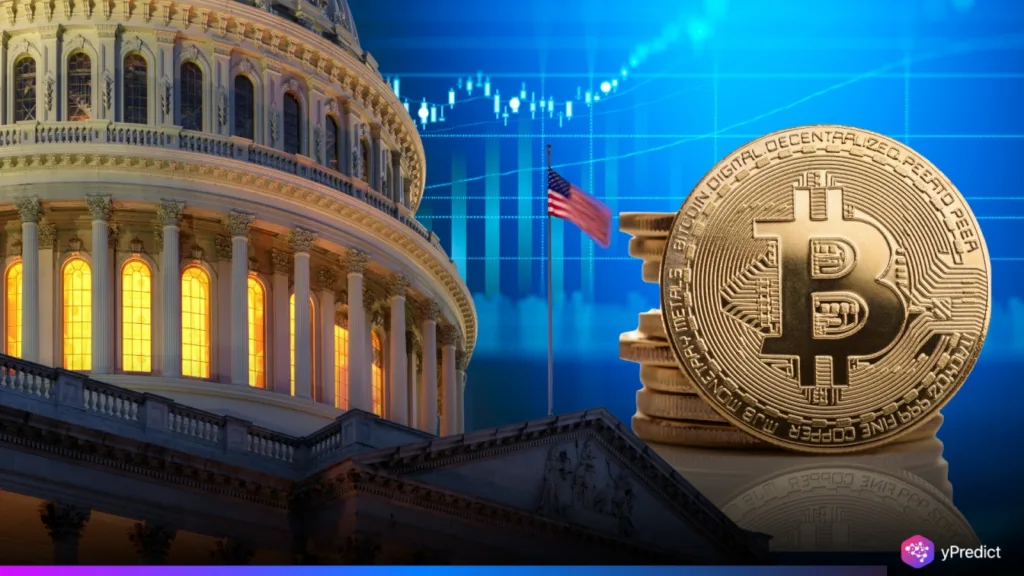
The U.S. House of Representatives is about to approve a massive Bitcoin Bill that could reshape the crypto market’s future. The development materialized quickly when Caitlin Long, CEO of Custodia Bank, confirmed progress of the legislation in a video interview from CNBC Crypto World. The move signals Washington’s strongest attempt yet to bring clarity to digital assets while reinforcing market stability and investor trust.
House Pushes Forward on Crypto Market Structure
The confirmation comes at a time when lawmakers are increasing their efforts to create a defined regulatory framework for cryptocurrencies. Earlier this year, the House of Representatives passed the Digital Asset Market Clarity Act of 2025, proposed legislation that distinguishes between different types of tokens and assigns authority and responsibility for regulation. If that legislation is passed, established blockchains like Bitcoin will be treated as commodities and treated as such by the Commodity Futures Trading Commission, not to mention their identity as securities.
The previously proposed pending Bitcoin Bill now goes further than these principles. The vision is to try to ensure the same framework would apply to the crypto market as a whole. And yes, supporters state this could reduce uncertainty, attract institutional investors, and strengthen America’s dominance in digital finance. The momentum from the House reflects a growing sense that the crypto industry must have market-based regulations to allow for innovation and development without creating instability.
Custodia Bank’s Role in Shaping the Debate
Custodia Bank and its CEO, Caitlin Long, have been outspoken advocates of fair and transparent regulations in the crypto space. Long confirmed that the House will pass the Bitcoin Bill that demonstrates how insiders within the industry continue to move Washington’s needle.
Custodia Bank is hoping for limited regulation clarity similar to the rest of the crypto space, where banks, exchanges, and investors would want protections from abrupt law enforcement actions. Long and her bank are trying to create a balance between regulation and innovation while maintaining US dominance in a global race for financial technology.
Senate Action and Stablecoin Regulation
The momentum isn’t limited to the House, as the Senate has recently passed the GENIUS Act, which provides oversight for stablecoins. The bill creates guardrails for dollar-backed tokens in an attempt to protect investors while fostering innovation in digital payment systems.
The House and Senate initiatives represent a concrete change in the U.S. regulatory paradigm of the crypto industry. Where other years may have left analysts and regulators in a fog of gridlock and uncertainty, it looks as if the chambers are on an aligned path to create a cohesive scheme for the crypto market. Analysts say the Bitcoin Bill will boost mainstream adoption once Congress passes it, as financial institutions gain confidence from clear rules.
Institutional Adoption Gains Strength
The call for regulation arrives at the same time as the incredibly fast rate at which institutions are embracing Bitcoin. Investors have driven Bitcoin ETFs up 137% since launch, showing strong demand for regulated cryptocurrency products. This increase is indicative of the profound convergence of traditional finance and digital assets into an asset class that fundamentally changes how investors allocate capital.
Institutional players like pension funds, asset managers, etc., will likely increase their crypto exposure, especially if there is a clear regulatory framework to reference. Retail investors like you and I uniformly will benefit from the regulatory oversight that may influence future decisions made by institutional players in the overall crypto market.
Looking Ahead
The U.S. looks more poised than ever to finally clarify how digital assets fit into the financial system. With the House about to pass the Bitcoin Bill, the Senate advancing on stablecoins, and institutions like Custodia Bank asking for balance, the crypto market is entering a new age.
Regulatory uncertainty has stifled innovation and investor confidence for years. Washington’s signals of intent suggest that digital assets are no longer a fringe discussion but are part of the pillars of financial policy. If lawmakers can solve the legislative deadlock, the U.S. may take the helm in dictating the future of crypto regulations across the globe.






